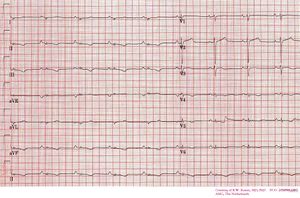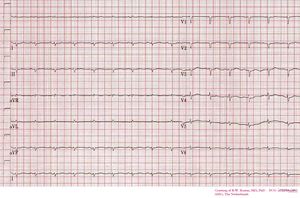Microvoltages: Difference between revisions
Jump to navigation
Jump to search
mNo edit summary |
mNo edit summary |
||
| Line 5: | Line 5: | ||
* Cardiomyopathy, especially infiltrative cardiomyopathy, such as in amyloidosis | * Cardiomyopathy, especially infiltrative cardiomyopathy, such as in amyloidosis | ||
* Increased resistance between the skin and the electrodes: pneumothorax, obesity, pericardal effusion / tamponade, pleural effusion | * Increased resistance between the skin and the electrodes: pneumothorax, obesity, pericardal effusion / tamponade, pleural effusion | ||
* [[ | * [[Miscelaneous#Myocarditis|Myocarditis]] / [[Miscelaneous#Pericarditis|pericarditis]] | ||
* Heart transplantation, especially with chronic rejection | * Heart transplantation, especially with chronic rejection | ||
* Wrong ECG settings (e.g. sensitivity at 5 mm/mV instead of 10 mm/mV) | * Wrong ECG settings (e.g. sensitivity at 5 mm/mV instead of 10 mm/mV) | ||
Revision as of 13:39, 23 July 2007
Microvoltages are present when the QRS amplitude (the sum of the negative and positive parts) does not exceed 0.5 mV in any of the limb leads or 1.0mV in any of the chest leads. Causes of microvoltages:
- Cardiomyopathy, especially infiltrative cardiomyopathy, such as in amyloidosis
- Increased resistance between the skin and the electrodes: pneumothorax, obesity, pericardal effusion / tamponade, pleural effusion
- Myocarditis / pericarditis
- Heart transplantation, especially with chronic rejection
- Wrong ECG settings (e.g. sensitivity at 5 mm/mV instead of 10 mm/mV)

